-
 Bitcoin
Bitcoin $115000
0.12% -
 Ethereum
Ethereum $3701
4.50% -
 XRP
XRP $3.081
2.99% -
 Tether USDt
Tether USDt $0.0000
-0.01% -
 BNB
BNB $767.9
1.45% -
 Solana
Solana $169.5
3.13% -
 USDC
USDC $0.9999
0.01% -
 Dogecoin
Dogecoin $0.2106
4.30% -
 TRON
TRON $0.3334
1.62% -
 Cardano
Cardano $0.7564
2.54% -
 Stellar
Stellar $0.4165
0.76% -
 Hyperliquid
Hyperliquid $38.75
0.25% -
 Sui
Sui $3.593
3.00% -
 Chainlink
Chainlink $17.08
3.59% -
 Bitcoin Cash
Bitcoin Cash $573.6
4.35% -
 Hedera
Hedera $0.2508
-0.84% -
 Avalanche
Avalanche $23.07
6.46% -
 Ethena USDe
Ethena USDe $1.001
-0.02% -
 Litecoin
Litecoin $120.8
8.17% -
 UNUS SED LEO
UNUS SED LEO $8.943
-0.32% -
 Toncoin
Toncoin $3.400
-5.60% -
 Shiba Inu
Shiba Inu $0.00001255
1.54% -
 Uniswap
Uniswap $9.908
6.32% -
 Polkadot
Polkadot $3.718
2.10% -
 Monero
Monero $303.0
-0.74% -
 Dai
Dai $0.9999
-0.02% -
 Bitget Token
Bitget Token $4.392
0.91% -
 Cronos
Cronos $0.1403
6.31% -
 Pepe
Pepe $0.00001076
1.13% -
 Aave
Aave $267.2
1.80%
How to set price alerts in OKX contracts?
OKX offers in-app, email, and third-party tool price alerts for cryptocurrency contracts, requiring users to select notification methods and set trigger prices; security best practices are crucial.
Mar 21, 2025 at 08:49 am
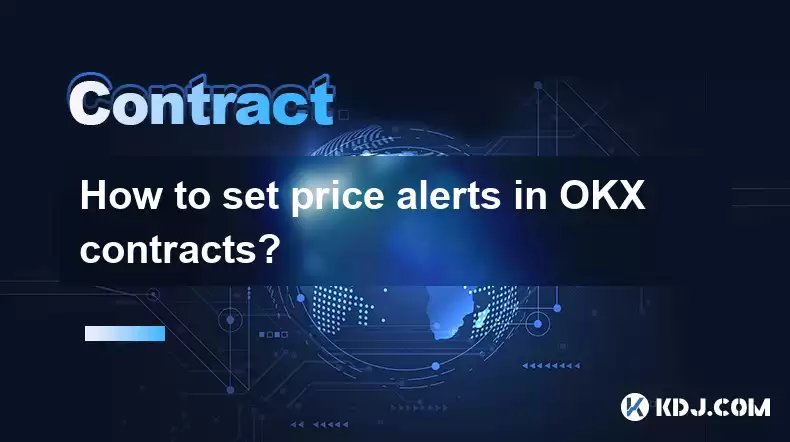
Key Points:
- OKX offers several methods for setting price alerts on contracts, catering to different needs and technical proficiencies.
- These methods include email notifications, in-app alerts, and third-party trading tools integration.
- Understanding your preferred notification method and setting appropriate price levels is crucial for effective alert management.
- Different contract types might have slightly different alert setting procedures within the OKX platform.
- Security best practices should always be followed to protect your account and prevent unauthorized access.
How to Set Price Alerts in OKX Contracts?
Setting price alerts in OKX contracts allows traders to receive timely notifications when a specific price level is reached for their chosen cryptocurrency contract. This proactive approach aids in managing risk and capitalizing on potential trading opportunities. OKX provides several ways to achieve this.
Method 1: Using the OKX Website or App's Built-in Alert System
This is the most straightforward method. Navigate to the contract trading interface for your chosen cryptocurrency. Locate the settings or options menu, usually represented by a gear icon or three dots. Look for a section related to "Alerts," "Notifications," or "Price Alerts." You'll typically need to specify the contract type (e.g., perpetual swap, futures), the price level (trigger price), and the direction (buy or sell). Finally, select your preferred notification method (email, app notification). Remember to save your settings.
Method 2: Utilizing Email Notifications
OKX allows you to configure email alerts. This method requires you to have a verified email address linked to your OKX account. The process is similar to using the in-app alert system. When setting up your alert, ensure you select "email" as the notification method. OKX will then send you an email when the specified price level is triggered. Regularly check your spam folder to ensure you don't miss any important alerts.
Method 3: Leveraging Third-Party Trading Tools and APIs
Many third-party trading tools and platforms integrate with OKX's API. These tools often provide advanced charting, analysis, and alert customization options beyond what's available within the OKX platform itself. This allows for more complex alert strategies, such as setting alerts based on multiple indicators or using trailing stops. However, using third-party tools requires careful selection and understanding of the associated risks.
Specific Contract Types and Alert Settings
The exact process for setting price alerts may vary slightly depending on the type of contract. Perpetual swaps and futures contracts generally have similar alert functionalities, but the specific parameters might be labeled differently. For instance, you might need to specify the contract's expiry date when setting an alert for a futures contract. Carefully review the instructions provided within each contract's trading interface.
Setting Multiple Alerts
OKX generally allows you to set multiple price alerts for different contracts or even multiple alerts for the same contract. For instance, you might set a buy alert at a lower price and a sell alert at a higher price for the same cryptocurrency contract. This approach requires careful planning to avoid conflicting or redundant alerts. Keep track of your active alerts to manage them efficiently.
Choosing the Right Notification Method
The best notification method depends on your individual preferences and trading style. In-app notifications are convenient for those actively monitoring the market. Email alerts are useful for those who may not be constantly watching the market but need to be informed of significant price movements.
Security Best Practices
Always use a strong and unique password for your OKX account. Enable two-factor authentication (2FA) for enhanced security. Be cautious when granting access to third-party applications and only use reputable tools. Regularly review your account activity and report any suspicious behavior immediately to OKX support. Never share your API keys with anyone.
Frequently Asked Questions:
Q: Can I set alerts for multiple contracts simultaneously?
A: Yes, OKX typically allows you to set alerts for multiple contracts at the same time. The exact method may vary slightly depending on the chosen method (in-app, email, or third-party tools).
Q: What happens if my internet connection is interrupted when a price alert is triggered?
A: The reliability of receiving an alert depends on your notification method. In-app notifications might be missed if you're offline, whereas email notifications will be sent and will be available once you regain internet access.
Q: Can I delete or modify existing price alerts?
A: Yes, you can usually manage your existing alerts by accessing the same settings menu where you initially created them. You should be able to edit or delete alerts as needed.
Q: Are there any fees associated with setting price alerts on OKX?
A: No, there are generally no additional fees charged by OKX for setting up and using price alerts.
Q: What happens if the price moves too quickly and surpasses my alert trigger price without triggering the notification?
A: The accuracy of alerts depends on the platform's responsiveness and your internet connection. While OKX strives for timely notifications, there might be slight delays, and extremely rapid price movements might occasionally be missed.
Q: Can I set alerts based on indicators other than price?
A: While the built-in OKX alert system primarily focuses on price, some third-party trading tools integrating with the OKX API might allow you to create more complex alerts based on various technical indicators.
Q: What if I forget my alert settings?
A: You can usually access your saved alert settings through the account settings or notification settings within the OKX platform. The exact location might vary slightly depending on the interface you are using (web or mobile app).
Disclaimer:info@kdj.com
The information provided is not trading advice. kdj.com does not assume any responsibility for any investments made based on the information provided in this article. Cryptocurrencies are highly volatile and it is highly recommended that you invest with caution after thorough research!
If you believe that the content used on this website infringes your copyright, please contact us immediately (info@kdj.com) and we will delete it promptly.
- Velo Universe, DEX, and DeFi Security: Navigating the Future of Decentralized Trading
- 2025-08-05 09:25:13
- Bitget Wallet Revolutionizes Solana with Gas-Free Transactions: A New Era for DeFi
- 2025-08-05 09:25:13
- Ozak AI, Crypto Boom, and ROI Potential: Is This the Next Big Thing?
- 2025-08-05 09:25:24
- Solana's ETF Hopes & the All-Time High Chase: Is SOL Set to Soar?
- 2025-08-05 09:25:24
- Coinbase's Brian Armstrong and the Art of Focused Work: A Deep Dive
- 2025-08-05 09:25:30
- Uniswap Price Prediction: Bullish Reversal on the Horizon?
- 2025-08-05 09:25:30
Related knowledge
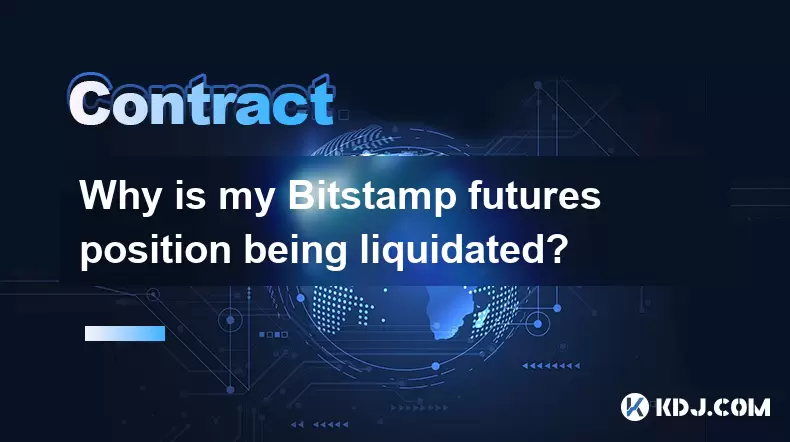
Why is my Bitstamp futures position being liquidated?
Jul 23,2025 at 11:08am
Understanding Futures Liquidation on BitstampFutures trading on Bitstamp involves borrowing funds to open leveraged positions, which amplifies both po...
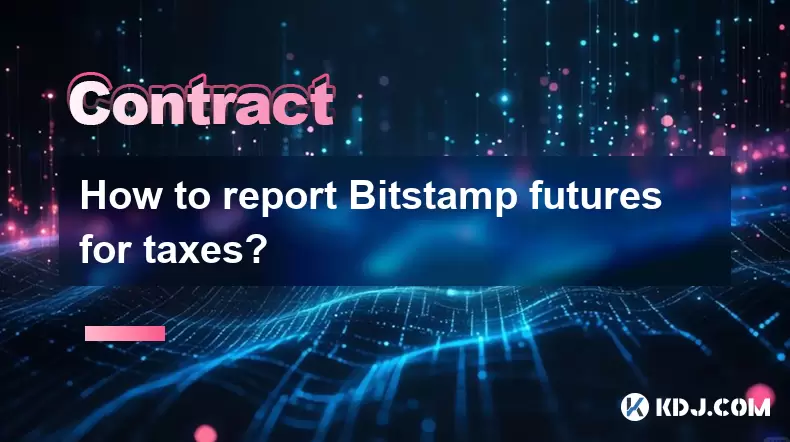
How to report Bitstamp futures for taxes?
Jul 30,2025 at 08:35am
Understanding Bitstamp Futures and Taxable EventsWhen trading Bitstamp futures, it’s essential to recognize that these financial instruments are treat...
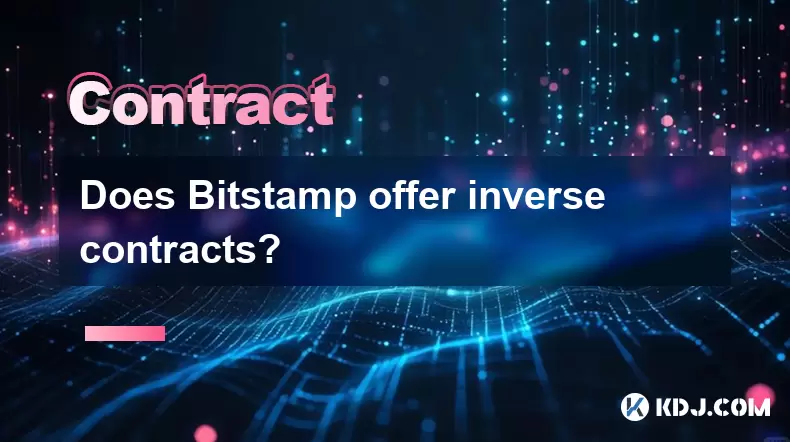
Does Bitstamp offer inverse contracts?
Jul 23,2025 at 01:28pm
Understanding Inverse Contracts in Cryptocurrency TradingIn the realm of cryptocurrency derivatives, inverse contracts are a specific type of futures ...
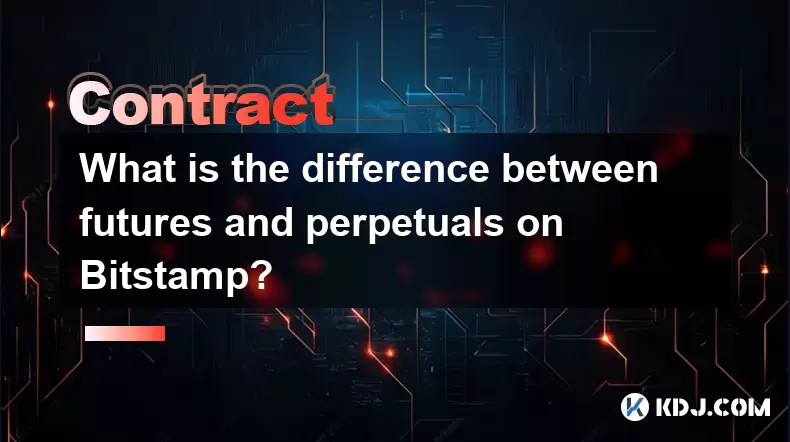
What is the difference between futures and perpetuals on Bitstamp?
Jul 27,2025 at 05:08am
Understanding Futures Contracts on BitstampFutures contracts on Bitstamp are financial derivatives that allow traders to speculate on the future price...
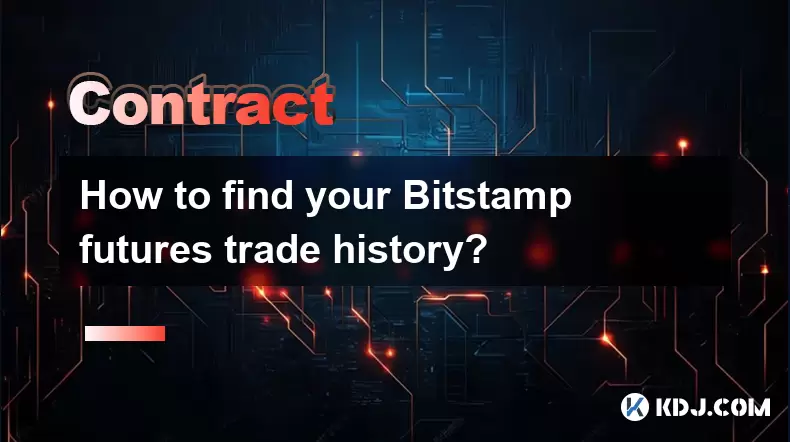
How to find your Bitstamp futures trade history?
Jul 23,2025 at 08:07am
Understanding Bitstamp and Futures Trading AvailabilityAs of the current state of Bitstamp’s service offerings, it is critical to clarify that Bitstam...
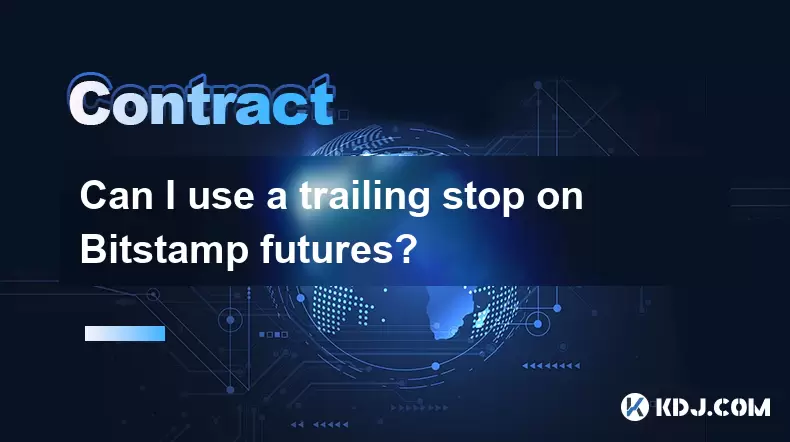
Can I use a trailing stop on Bitstamp futures?
Jul 23,2025 at 01:42pm
Understanding Trailing Stops in Cryptocurrency TradingA trailing stop is a dynamic type of stop-loss order that adjusts automatically as the price of ...

Why is my Bitstamp futures position being liquidated?
Jul 23,2025 at 11:08am
Understanding Futures Liquidation on BitstampFutures trading on Bitstamp involves borrowing funds to open leveraged positions, which amplifies both po...

How to report Bitstamp futures for taxes?
Jul 30,2025 at 08:35am
Understanding Bitstamp Futures and Taxable EventsWhen trading Bitstamp futures, it’s essential to recognize that these financial instruments are treat...

Does Bitstamp offer inverse contracts?
Jul 23,2025 at 01:28pm
Understanding Inverse Contracts in Cryptocurrency TradingIn the realm of cryptocurrency derivatives, inverse contracts are a specific type of futures ...

What is the difference between futures and perpetuals on Bitstamp?
Jul 27,2025 at 05:08am
Understanding Futures Contracts on BitstampFutures contracts on Bitstamp are financial derivatives that allow traders to speculate on the future price...

How to find your Bitstamp futures trade history?
Jul 23,2025 at 08:07am
Understanding Bitstamp and Futures Trading AvailabilityAs of the current state of Bitstamp’s service offerings, it is critical to clarify that Bitstam...

Can I use a trailing stop on Bitstamp futures?
Jul 23,2025 at 01:42pm
Understanding Trailing Stops in Cryptocurrency TradingA trailing stop is a dynamic type of stop-loss order that adjusts automatically as the price of ...
See all articles

























































































